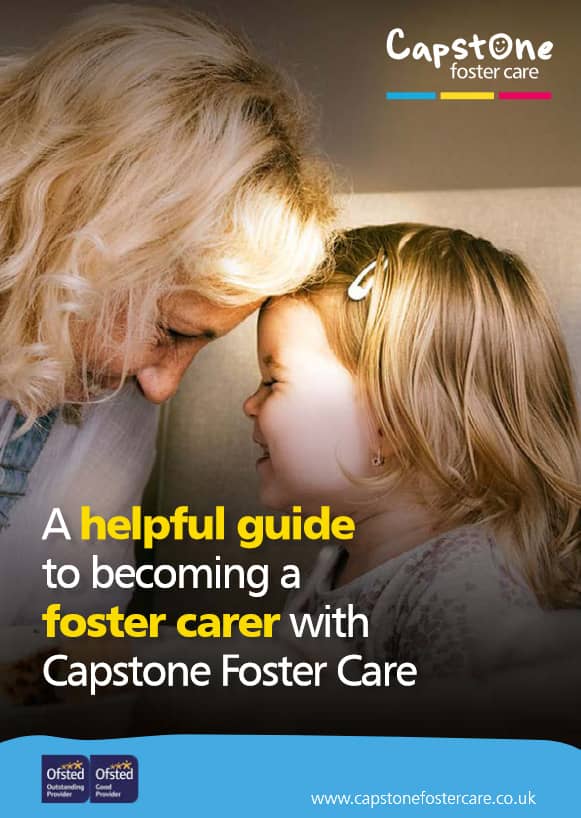


Fostering a disabled child
The role of an independent fostering agency
How to choose a foster care agency
Can I choose who I foster?
What are the benefits of fostering with an independent fostering agency?
What happens when a child is taken into care?
Fostering process: what happens on an initial home visit?
Fostering with local authority vs independent agency
A complete guide to becoming a foster carer
How Are Children in Foster Care Matched with Carers?
Foster Care Budgeting Tips
Becoming A Foster Carer
What is a Care Leaver?
What is a Foster Carer?
Fostering Regulations
How long does it take to become a Foster Carer?
What are the Foster Care requirements?
Changing IFA - Transferring to Capstone
8 reasons why a child may be taken into care
Fostering as a Career
Can you foster if you smoke or vape?
A guide to fostering assessments
LGBTQ+ Fostering
Equality, Inclusion & Anti-discriminatory Practice in Foster Care
What can disqualify you from foster care?
Can you foster if you’re on benefits?
Top transferable job skills to become a foster carer
Fostering as a same sex couple
Fostering while renting
Can you foster if you have mental health issues?
Is there an age limit for fostering in the UK?
Do foster carers get a pension?
How to foster a child: A step by step guide
How do DBS Checks Work?
Can I foster if...?
Mythbusting the top 10 Foster Care Myths
Can I foster if I am disabled?
LGBT Fostering Mythbusting
Can I foster if I have pets?
Can I Foster A Child?
Can I Foster and Work?
Can you Foster with a Criminal Record
Can Single People Foster?
LGBT Family and Foster Care
Fostering across Cultures
Muslim Fostering
Christian Foster Care
Sikh Fostering
Empty Nest Syndrome and Foster Care
Can I Foster?
What is the difference between residential care and foster care?
Fostering Babies and Young Children
What is Kinship Care?
Fostering Babies - Myths
Focusing on Parent & Child Fostering
Fostering Siblings
Fostering Teenagers
Fostering Teenagers - Breaking down the Myths
Fostering Unaccompanied and Asylum Seeking Children
Mother and Baby Foster Placements
Private Fostering
How does therapeutic fostering work?
Young Children Fostering Placements
Difference between short and long-term fostering
Types of self-harm
A Guide to the Foster Care Handbook
Reunification and Birth Parents: A Guide for Foster Carers
What is an EHC Plan? A Guide for Foster Carers
How to prepare a child for becoming a care leaver
Children who foster: impact of fostering on birth children
Fostering LGBTQ+ Youth
How to prepare your home for a foster child
How to help a lonely child: A Guide for Foster Carers
What are the National Minimum Standards for Fostering Services?
10 tips for foster children's education
How to prepare your foster child for secondary school
Tips for coping when foster placements end
Tips for foster parents during Coronavirus
What happens if foster parents get divorced?
5 ways to manage Mother's Day with foster children
Tips for managing foster children's bedtime routines
How to handle foster child bullying
Fostering allowances and the gender pay gap
What discounts can foster carers get?
How to adopt from Foster Care
5 ways to manage Father's Day for children in foster care
8 most common fostering challenges
FosterTalk Membership with Capstone Foster Care
Supporting foster children's contact with birth families
A guide to independent fostering
Keeping Children Safe Online: A Guide For Foster Carers
Movies About Foster Care
Play-based learning strategies for foster carers
A Guide to the Staying Put Program
Why Foster Parent Wellbeing Matters
How to deal with empty nest syndrome
How to recognise signs of depression in foster children
Can you take a foster child on holiday?
Tips and advice on fostering with a disability
10 tips on connecting with your Foster Child
Fostering vs Adoption - What's the difference?
How Fostering can change a future
How to adopt from Foster Care
How to encourage children to read in Foster Care
How to prepare a Foster Child's bedroom
Reading and Storytelling with Babies and Young Children
Supporting Children's Learning
The 20 most recommended books Foster Carers and young people should read
Things you can do when your children leave home
The impact of early childhood traumas on adolescence and adulthood
Anxious Disorders in Foster Children
What is sexual abuse and sexual violence
Foster Child behaviour management strategies
Foster Parent Advice: What to expect in your first year of fostering
Capstone's twelve tips at Christmas
10 celebrities who grew up in Foster Care
Could Millenials be the solution to the Foster Care crisis?
Do you work in Emergency Services?
Form F Assessor and Assessment Training
Foster Care Fortnight
Improving Children's Welfare - Celebrating Universal Children's Day
New Year - New Career - Become a Foster Carer
Young People Charities
However, some of the most common reasons for a child to be taken into care include:
Find out more of the most common reasons for foster care, and what happens when a child is taken into care – whether it’s when social services remove a child, or placing your child into care yourself.
A survey from 2020-21 reported that there are approximately 108,157 children in the UK care system. But what are the most common reasons for them entering into the care system?
Another common form of abuse is substance abuse. If the parents or guardians suffer from a drug addiction or alcoholism, they are unfit to take care of a child as they naturally put less reliance on their parental responsibilities. If they cannot seek help and address their addiction in a way that keeps the child safe, social services will likely take this child into care initially on a short term basis, but this will then be assessed.
Neglect can come in many forms – and if a child is proven to be neglected, this can lead to them being placed in the foster care system. Examples of neglect could include:
This is when the parenting capacity of the birth parents, or guardians, has been judged as inadequate, as the child’s needs are consistently not being met. There could be domestic violence in the family home, continuous conflict or parental mental health issues which put the child’s safety at risk.
Some children could be placed in foster care due to circumstances of asylum which has left them unaccompanied. In these cases, children aren’t being removed due to abuse or neglect, but instead, to seek refuge and shelter in a safe country.
A child may need to be placed in care on a temporary basis if a family, or family members, are going through a crisis. This could be due to finance issues, homelessness, eviction or many more circumstances. In some cases, this may be a result of criminal conviction or gang-related issues.
If parents or guardians have been sentenced to jail, and there is nobody who can look after them while they finish their sentence, they will likely be placed into care.
Whether this is dropping children off at a babysitter’s and never returning, or leaving the children at home alone for an extended period of time, abandonment from the birth parents will lead to the child entering the care system.
Physical or mental illness of the parents or caregivers can lead to them not being able to look after their child – and either temporary or permanent foster care may be required.
In the case of the parents or guardians dying, and there isn’t an appropriate adult to look after the child, this would then lead to the child being placed into care.
On rare occasions, reasons for foster care could be voluntarily putting your child into care. This could be due to a wide range of reasons – potentially including some of the above – but mainly due to the issue that the parents cannot, or do not, want to look after the child any longer.
There’s also a difference between children being put into foster care due to circumstances at home they cannot control, and circumstances which they can. For example, there are some instances where foster children may need to be put into care due to their own actions, if their parents or guardians cannot take care of them or control their behaviour:
When a child is placed into care, a local authority is called in to assess the child’s situation and determine the category of need for foster care. The purpose of this foster care is to ensure the child is provided with a substantial substitute home where they can be taken care of. It’s not uncommon for some foster parents to stay in the lives of their foster children until they have aged out of the system – as their previous home and living with their birth parents may never be suitable for them again.
In England, children can be fostered from birth right up into the age of 18, however, some legislation supports children being in foster care until 21. In Northern Ireland, a young person may remain in foster care as long as they’re in education or training. Learn more about care leavers from our dedicated guide.
A care order is given by a court, and allows for a child to be taken into care. Under the Children Act of 1989, a council is able to apply for a care order if they believe that a child is in risk of harm. Care orders last until a child’s 18th birthday - however, in some cases, a court is able to discharge the order.
A foster parent is needed to build feelings of confidence and trust in order to improve the child’s long-term potential. To become a foster parent, you will need to be over 21 years of age and have the legal right to work in the UK. You will also need to have a spare room in your house. Learn more about the foster care requirements from our detailed guide.
Now you’ve learnt the most common reasons social services would take a child or why children can be placed in foster care, learn more about becoming a foster carer today. Alternatively, for more information or advice, get in touch with any of our experts at Capstone Foster Care today.
If you’ve got any questions or would like to find out more about fostering with Capstone, fill out the form below.
An experienced fostering advisor from your local area will then be in touch.

Start the conversation today. Our team of friendly advisors are on hand to answer any foster care questions you may have. We can offer you honest and practical advice that can help you decide if becoming a foster carer is the right path for you.


